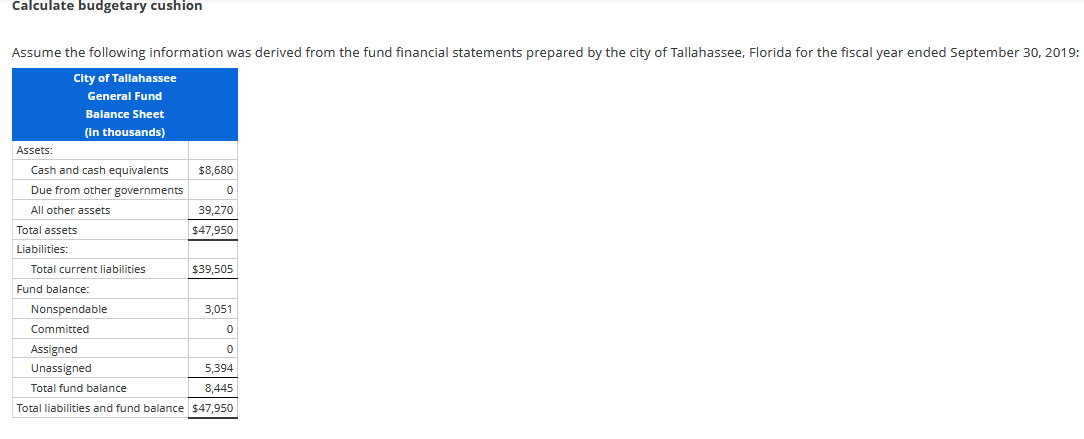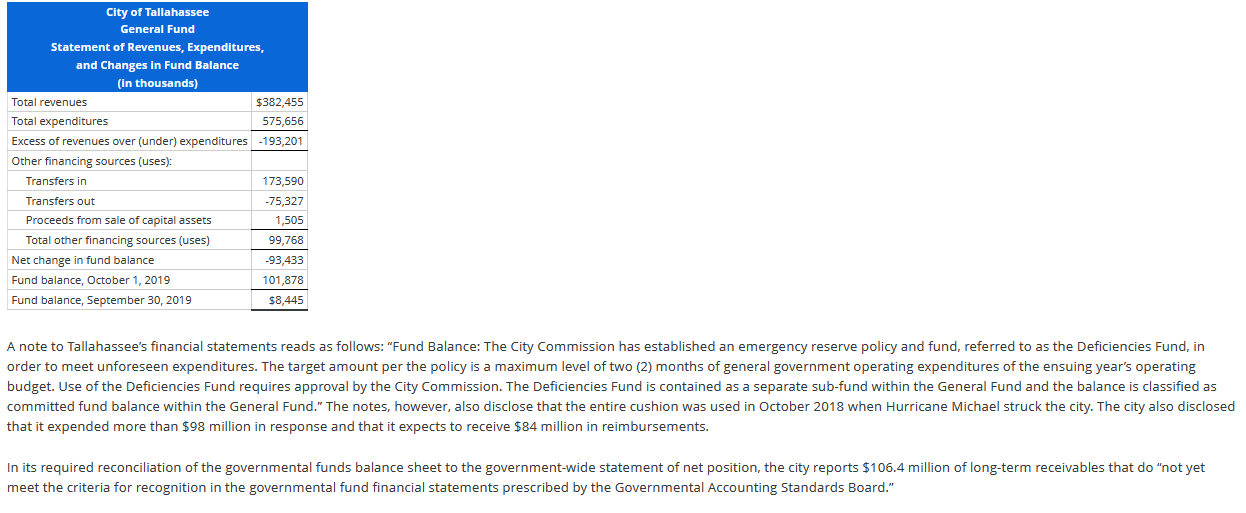


Calculate budgetary cushion Assume the following information was derived from the fund financial statements prepared by the city of Tallahassee, Florida for the fiscal year ended September 30, 2019: City of Tallahassee General Fund Balance Sheet (in thousands) Assets: Cash and cash equivalents $8,680 Due from other governments 0 All other assets 39,270 Total assets $47,950 Liabilities: Total current liabilities $39,505 Fund balance: Nonspendable 3,051 Committed 0 Assigned 0 Unassigned 5,394 Total fund balance 8,445 Total liabilities and fund balance $47,950 City of Tallahassee General Fund Statement of Revenues, Expenditures, and Changes in Fund Balance (in thousands) Total revenues $382,455 Total expenditures 575,656 Excess of revenues over (under) expenditures -193,201 Other financing sources (uses): Transfers in 173,590 Transfers out -75,327 Proceeds from sale of capital assets 1,505 Total other financing sources (uses) 99,768 Net change in fund balance -93,433 Fund balance, October 1, 2019 101,878 Fund balance, September 30, 2019 $8,445 A note to Tallahassee's financial statements reads as follows: "Fund Balance: The City Commission has established an emergency reserve policy and fund, referred to as the Deficiencies Fund, in order to meet unforeseen expenditures. The target amount per the policy is a maximum level of two (2) months of general government operating expenditures of the ensuing year's operating budget. Use of the Deficiencies Fund requires approval by the City Commission. The Deficiencies Fund is contained as a separate sub-fund within the General Fund and the balance is classified as committed fund balance within the General Fund." The notes, however, also disclose that the entire cushion was used in October 2018 when Hurricane Michael struck the city. The city also disclosed that it expended more than $98 million in response and that it expects to receive $84 million in reimbursements. In its required reconciliation of the governmental funds balance sheet to the government-wide statement of net position, the city reports $106.4 million of long-term receivables that do "not yet meet the criteria for recognition in the governmental fund financial statements prescribed by the Governmental Accounting Standards Board." In its required reconciliation of the governmental funds balance sheet to the government-wide statement of net position, the city reports $106.4 million of long-term receivables that do "not yet meet the criteria for recognition in the governmental fund financial statements prescribed by the Governmental Accounting Standards Board." a) Calculate the current budgetary cushion using the data as reported. 15 X 96 Use revenues plus transfers as the denominator. Round percentage to two decimals. b) Using the GFOA Best Practices guideline, would the budgetary cushion be considered reasonable, too high, or too low? Too low C) Analysts would likely consider the $106.4 million long-term receivable as 'available' in their calculations. Calculate the budgetary cushion including the $106.4 million receivable. X 96 Use revenues plus transfers as the denominator. Round percentage to two decimals 0 d) Using the GFOA Best Practices guideline, would the adjusted budgetary cushion be considered reasonable, too high, or too low? Reasonable









